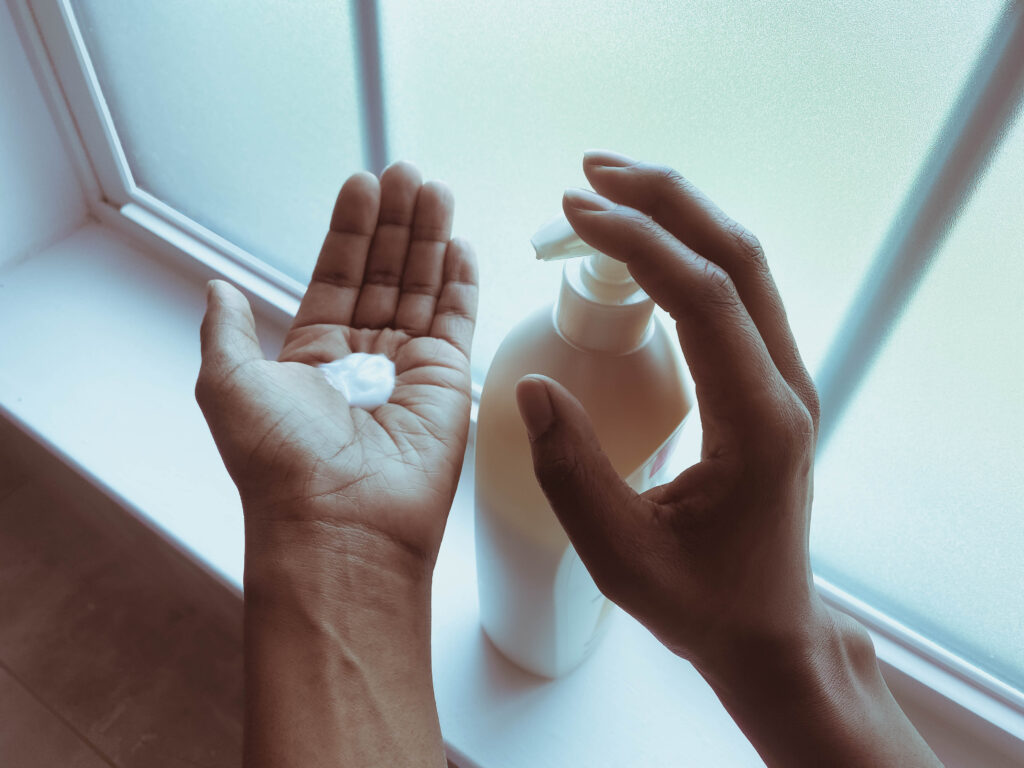
Keeping your skin supple and moisturized is important and most lotions can be rubbed on much of the body and used safely and effectively with no side effects. However, burning, stinging, redness, irritation or even worse may occur if you put lotion on some body parts that lotion was never intended to be.
Dry skin is a common problem worldwide and can affect almost everyone as the global population ages. Superficial cracking, itching, and stinging can result in general discomfort, and severity has been linked to multiple exogenous factors, such as dry climates, colder winter months, and excessive showering or bathing. However, as the physiological properties of skin differ widely between races, it is therefore not surprising that given the same external environment, dry skin can be more problematic for some patients. While studies continue to delve deeper into the racial variability of skin, quantifiable parameters have been developed showing differences in transepidermal water loss, water content, ceramide levels, and skin reactivity between Caucasian, Black, and Asian subjects. Although the marketplace is flooded with a diverse array of commercial products, ongoing research in skin moisturizers and ethnic differences in skin biology may allow clinicians to develop targeted, patient-specific regimens to treat dry skin.
Even though it may be rare, some people may have very bad and sometimes deadly side effects when taking a drug. Tell your doctor or get medical help right away if you have any of the following signs or symptoms that may be related to a very bad side effect:
- Signs of an allergic reaction, like rash; hives; itching; red, swollen, blistered, or peeling skin with or without fever; wheezing; tightness in the chest or throat; trouble breathing, swallowing, or talking; unusual hoarseness; or swelling of the mouth, face, lips, tongue, or throat.
- Signs of skin infection like oozing, heat, swelling, redness, or pain.
- Bleeding that is not normal from the affected part.
- Fever.
Before we get into where you shouldn’t put lotion, here are some moisturizers should you use:
3 Best Moisturizers for Black Skin
1. Toleriane Double Repair Moisturizer SPF 30
Price: $23
“This moisturizer contains ceramides and hyaluronic acid, which help to hydrate and strengthen the skin barrier. It is suitable for sensitive skin and very affordable, and it has multiple formulations. A day version with SPF and a standard without SPF is often recommended by skin-health professionals.” — Thornton
Pros: Relatively inexpensive, contains skin barrier-supporting ingredients like hyaluronic acid and ceramides, suitable for sensitive skin.
Cons: Contains silicones.
Customer Review: “This is my favorite moisturizer with SPF. I discovered this brand in a pharmacy store in Paris a few years ago and use their other products too. Hope to get to their spa one day!”
2. Klur Sculpture + A Overnight Enrichment Cream
Price: $150
This moisturizer from Thornton’s skincare brand Klur is great for those who may struggle with acne and dark spots. It’s an overnight retinol cream that’s gentle (yet powerful) while lifting pigment and speeding up skin cell turnover. In addition to retinol, it also contains 19 anti-inflammatory plant ingredients and peptides to firm the skin and calm redness.
Pros: Contains retinol to help speed up skin cell turnover, has 19 anti-inflammatory plant ingredients, and contains peptides to tighten aging skin.
Cons: More on the expensive side.
Customer Review: “Obsessed with Klur’s Sculpture + A. … I use this a few nights a week, and it is truly magic in a jar. I have two young toddlers that exhaust me 24/7 and have added at least 10 years to my face in the last year. Whenever I use this product, I wake up the next morning looking a little more youthful around the eyes, and my skin looks healthier with a nice subtle glow. Grateful this product exists as it has become a new staple in my routine!”
3. Fenty Skin Hydra Vizor Invisible Face Moisturizer
Price: $39
Fenty’s SPF 30 moisturizer locks in hydration; helps fade dark spots; and smooths out enlarged pores with ingredients like niacinamide, Kalahari melon, hyaluronic acid, and aloe.
Pros: Contains SPF 30 to protect, niacinamide to help fade dark spots and provide excess-oil control, and hyaluronic acid to deeply hydrate the skin.
Cons: Contains chemical sunscreen filters.
Customer Review: “Started using Total Cleans’r, Fat Water Toner Serum, and Hydra Vizor with SPF in Dec 2022 almost consistently morning and night and my skin glows. I get plenty of sun so lucky to have found this face combo!”
5 Body Parts You Should Never Put Lotion On
If you use lotion on a daily basis, according to board-certified Family Medicine physician, Dr. Jen Caudle, here are five places on your body that you should never put lotion:
1. Your Arpmits
You don’t want to put lotion on your armpits or under your armpits because this is an area that you want to keep dry and fresh.
That goes for if you sweat a lot too. A damp underarm not only makes your body odor smell bad, it can also cause infection underneath the skin.
Top dermatologists recommend you drink PLENTY of water. Water is not only great for staying healthy, it is great for reducing sweat too! Water helps to keep your inner body temperature lower, therefore limiting the need for your body to produce sweat.
2. Your Genital Area and Your Butt
Lotions and other skin products contain chemicals and natural ingredients not found inside the vagina or around the head of the penis. As the vagina stays healthy by keeping a delicate acidic pH, putting a sheet mask on or in your vagina could disrupt the balance and result in a yeast infection or bacterial infection.
The skin around the vulva is sensitive, and putting harsh chemicals in that area to exfoliate or prevent aging can be very irritating to the area.
3. Your Face
Now, this is said with a lot of caution because we think lotion on our face is okay. But in reality, it’s not. When we run out of our regular face cream, body lotion often becomes the go-to product for the face.
However, it should not be used on delicate facial skin. As body lotion is thicker in density and greasier, its oily texture can clog facial skin pores and cause an acne breakout. Also, body lotions tend to have artificial fragrances. These may lead to an allergic reaction.
4. Between Your Toes
The American Diabetes Association says that you should avoid putting lotion between your toes for a number of reasons.
People with diabetes can develop many different foot problems. Even ordinary problems can get worse and lead to serious complications. So they say to moisturize your feet, but avoid moisturizing between your toes in order to keep infections from growing and causing even more problems.
The also caution to keep your toenails trim, and use an emery board to file down sharp edges. Check your feet for sores, cuts, blisters, corns, or redness daily. Let your doctor know if you find any of these.
Also, wear moisture-wicking socks to keep moisture from forming after long hours of wearing socks and shoes.
5. Your Belly Button
If you have an inward belly button, avoid putting lotion in your belly button at all costs. Lotion in your belly button can further promote bacterial organisms in that area. Now, if you were to look at your belly button, Dr. Jen says it’s like a cave; it’s dark and full of moisture which means its ripe for nasty infections.
All in all, keep your body soft and healthy by knowing where to put (and where not to put) lotion.








